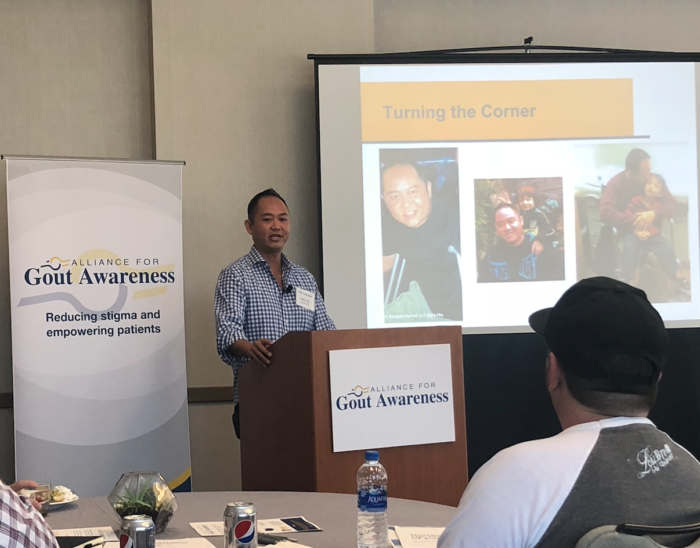Painful, debilitating and highly stigmatized, gout affects 8-9 million Americans. The disease occurs when uric acid builds up in the joints, triggering agonizing attacks and disrupting people’s day-to-day lives. But the Alliance for Gout Awareness has a message for frustrated patients: Don’t give up.

At the group’s recent Patient Empowerment Forum in Austin, Texas, rheumatologist and Alliance for Gout Awareness Physician Advisor Christopher Parker, MD, addressed patients and their caregivers about the importance of treating gout. He was joined by the organization’s patient advisor, Gary Ho.
Step one? Debunking treatment myths. “Yams, cherry juice…apple cider,” said Dr. Parker, rattling off foods commonly believed to cure gout. “That’s a poor way to get long-term success.”
And long-term success is key. Gout can cause significant damage if not properly treated. “You can tear through joints. You can erode through bone,” Dr. Parker emphasized to the audience.
But the disease’s detrimental effects are no reason for patients to throw up their hands. A gout specialist can advise about changes to diet or exercise regimen. They can also prescribe treatment to lower patients’ uric acid levels, reducing the number of gout attacks.
Granted, a subset of people have gout that resists treatment, an experience that Dr. Parker has witnessed with his own patients. “Even when you take big doses of these medicines, you just can’t get it under control,” he explained. But a gout specialist can also advise about specialized treatment for these patients.
Treating gout in any form, however, begins with patients who recognize the symptoms and seek medical attention. Though the disease causes severe pain, not all patients recognize gout as the source. Others are inhibited by stigma. Gout is often perceived as the result of excess in one’s eating habits or alcohol consumption.
But gout’s impact and prevalence demand that patients become more aware – and more empowered to meet the challenges of the disease. “I’m here to encourage other people,” Gary Ho emphasized to fellow patients in the audience, “I can tell you that, with gout, quality of life is possible. I manage this disease; it no longer manages me.”
Watch highlights from the Alliance for Gout Awareness’ Patient Empowerment Forum to learn more.

